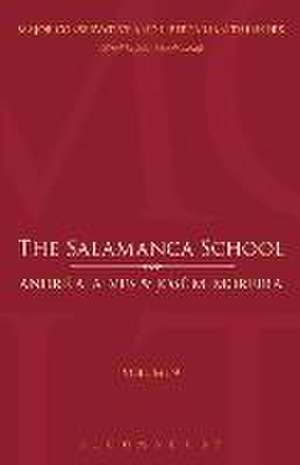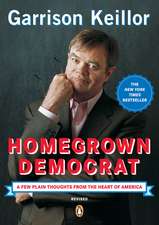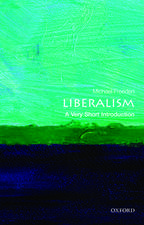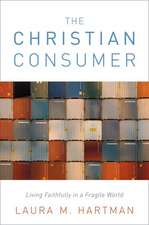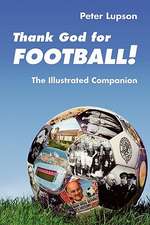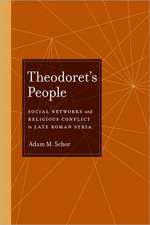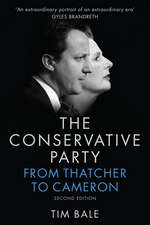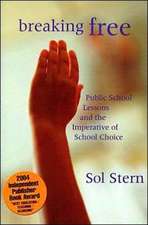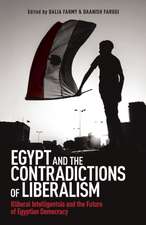The Salamanca School: Major Conservative and Libertarian Thinkers
Autor Andre Azevedo Alves, Jose Moreiraen Limba Engleză Paperback – 8 mai 2013
| Toate formatele și edițiile | Preț | Express |
|---|---|---|
| Paperback (1) | 189.18 lei 6-8 săpt. | |
| Bloomsbury Publishing – 8 mai 2013 | 189.18 lei 6-8 săpt. | |
| Hardback (1) | 946.31 lei 6-8 săpt. | |
| Bloomsbury Publishing – 18 ian 2010 | 946.31 lei 6-8 săpt. |
Din seria Major Conservative and Libertarian Thinkers
- 22%
 Preț: 945.88 lei
Preț: 945.88 lei - 14%
 Preț: 183.70 lei
Preț: 183.70 lei -
 Preț: 331.80 lei
Preț: 331.80 lei -
 Preț: 215.25 lei
Preț: 215.25 lei - 13%
 Preț: 222.27 lei
Preț: 222.27 lei - 13%
 Preț: 222.27 lei
Preț: 222.27 lei - 13%
 Preț: 222.27 lei
Preț: 222.27 lei - 13%
 Preț: 221.83 lei
Preț: 221.83 lei -
 Preț: 215.25 lei
Preț: 215.25 lei -
 Preț: 183.70 lei
Preț: 183.70 lei -
 Preț: 183.24 lei
Preț: 183.24 lei - 24%
 Preț: 182.35 lei
Preț: 182.35 lei -
 Preț: 189.61 lei
Preț: 189.61 lei - 14%
 Preț: 183.24 lei
Preț: 183.24 lei - 14%
 Preț: 190.96 lei
Preț: 190.96 lei -
 Preț: 215.25 lei
Preț: 215.25 lei -
 Preț: 222.27 lei
Preț: 222.27 lei - 14%
 Preț: 189.18 lei
Preț: 189.18 lei
Preț: 189.18 lei
Nou
Puncte Express: 284
Preț estimativ în valută:
36.20€ • 37.89$ • 30.13£
36.20€ • 37.89$ • 30.13£
Carte tipărită la comandă
Livrare economică 01-15 aprilie
Preluare comenzi: 021 569.72.76
Specificații
ISBN-13: 9781441177797
ISBN-10: 1441177795
Pagini: 168
Dimensiuni: 137 x 216 x 15 mm
Greutate: 0.23 kg
Editura: Bloomsbury Publishing
Colecția Bloomsbury Academic
Seria Major Conservative and Libertarian Thinkers
Locul publicării:New York, United States
ISBN-10: 1441177795
Pagini: 168
Dimensiuni: 137 x 216 x 15 mm
Greutate: 0.23 kg
Editura: Bloomsbury Publishing
Colecția Bloomsbury Academic
Seria Major Conservative and Libertarian Thinkers
Locul publicării:New York, United States
Caracteristici
As relatively little has been written on the Salamanca School, the inclusion of this volume in the series would be a strong and unique selling point.
Notă biografică
José Moreira is a Professor of Economics at the Universidade de Aveiro, Portugal.André Azavedo Alves is Assistant Professor of Political Science at the Catholic University of Portugal.
Cuprins
Series IntroductionSeries Editor's PrefaceChapter 1 - Historical context and intellectual biographyWhat is the 'School of Salamanca'?The political and intellectual context of the School of Salamanca The decline of scholasticismSome key authors of the School of SalamancaFrancisco de VitoriaDomingo de SotoMartín de AzpilcuetaDiego de Covarrubias y LeyaTomás de MercadoBartolomé de las CasasLuis de MolinaJuan de MarianaFrancisco SuárezChapter 2 - Critical exposition Philosophical and political foundations of the School Thomism and Natural Law The European revival of Thomism and the Salamanca School Theological-political disputes Applied political thought Individual rights and the common good The state and the limits of political power Legitimate resistance and tyrannicide Church and state International law and developments in Just War theory The ethical and juridical framework of the market Private property and trade Just price and the subjective theory of value Usury and interest Theories of banking Monetary theory and inflation Taxation and public finance Chapter 3 - Reception and influence of the workThe Salamanca School and the New World A revolutionary sermon in HispaniolaThe social experiments of Bartolomé De Las CasasJust titles and the disputation between Las Casas and SepúlvedaAssessing the legacy of Las Casas and the controversies over the New WorldTheological-political impact and influence on subsequent authorsChapter 4 - Relevance of the work todayPolitical philosophy, law and historyPolitical economy and the ethical foundations of the marketContemporary Catholic Social ThoughtInternational relations and war Concluding remarks BibliographyIndex
Recenzii
"The volumes in this timely series comprise the most comprehensive body of material on conservative and libertarian thought yet published in a single project devoted to the subject. The series will prove an indispensable tool not only for those concerned with the history of political thought but also for those who confront the challenging task of constructing a viable contemporary conservative identity. Professor Meadowcroft had a difficult editorial task, to which he has responded with a judicious choice of thinkers and topics." Noel O'Sullivan, Professor of Political Philosophy, the University of Hull, UK.
"This work is an important contribution to the history of legal and economic thought. The recognition at the U. N. of Francisco de Vitoria O. P. as the founder of international law has moved the School of Salamanca to its rightful place in intellectual history. Building on the thought of the late medieval Conciliarists, such as Cardinal Cajetan, the early modern Iberian thinkers expanded the theory of individual rights and limitation on government. Based on the revival of the work of Thomas Aquinas, de Vitoria brought from the University of Paris a new vitality to the historic Castilian University of Salamanca. De Vitoria's successors, such as Domingo de Soto O. P., Luis de Molina S. J., Juan de Marina S.J., and Francisco Suarez, S. J., continued the tradition at Salamanca and other Spanish and Portuguese universities, as well as in Lima and Mexico City. One of the most widely known was not an academic but an outspoken bishop of Yucatan, Bartolome de Las Casas, O. P. whose widely read writings in defense of the individual rights and property of the Native Americans drew from his teachers at Salamanca. This work examines the Salamanca analysis of the ethical and juridical framework of the market, the subjective theory of value, interest, monetary theory and inflation. Alves and Moreira conclude with the relevance of the School of Salamanca to contemporary Catholic social thought." --Professor Leonard P. Liggio, Distinguished Senior Scholar, Institute for Humane Studies, George Mason University; and Atlas Economic Research Foundation
"The importance of the School of Salamanca is slowing increasing in the studies of the origins of our modern Western culture. First, the jurists Brown-Scott, Nys or Barcia Trelles highlighted their importance in the field of International Law (the Vitoria's "Ius Gentium", which Grotius settled in Europe in the XVII Century); next they are admired as founders of the science of Economics (already said by Marjorie Grice Hutchinson, Joseph Schumpeter or Raymond de Roover for over more than fifty years and recently confirmed by Chaufuen), and even as forerunners of the Austrian School (Rothbard or Huerta de Soto), due to its proto-liberal thought in many issues related to philosophy, economics and politics.So far, there have been few studies on these topics --scattered, difficult to find, and in many cases published in Spanish. Indeed, this complete study on the late Scholastics in Spain, Europe and America was necessary. It is provided by professors Alves, Meadowcroft, and Moreira, who offer the Anglophone world a brilliant synthesis of the School of Salamanca, also updating the existing bibliography. These pages can both introduce students to this study while offering an opportunity to rethink the current social dilemmas and economic crisis from this philosophical and moral point of view." --Leon M. Gomez Rivas. Professor of Economic Thought. Universidad Europea de Madrid. Spain
"This work is an important contribution to the history of legal and economic thought. The recognition at the U. N. of Francisco de Vitoria O. P. as the founder of international law has moved the School of Salamanca to its rightful place in intellectual history. Building on the thought of the late medieval Conciliarists, such as Cardinal Cajetan, the early modern Iberian thinkers expanded the theory of individual rights and limitation on government. Based on the revival of the work of Thomas Aquinas, de Vitoria brought from the University of Paris a new vitality to the historic Castilian University of Salamanca. De Vitoria's successors, such as Domingo de Soto O. P., Luis de Molina S. J., Juan de Marina S.J., and Francisco Suarez, S. J., continued the tradition at Salamanca and other Spanish and Portuguese universities, as well as in Lima and Mexico City. One of the most widely known was not an academic but an outspoken bishop of Yucatan, Bartolome de Las Casas, O. P. whose widely read writings in defense of the individual rights and property of the Native Americans drew from his teachers at Salamanca. This work examines the Salamanca analysis of the ethical and juridical framework of the market, the subjective theory of value, interest, monetary theory and inflation. Alves and Moreira conclude with the relevance of the School of Salamanca to contemporary Catholic social thought." --Professor Leonard P. Liggio, Distinguished Senior Scholar, Institute for Humane Studies, George Mason University; and Atlas Economic Research Foundation
"The importance of the School of Salamanca is slowing increasing in the studies of the origins of our modern Western culture. First, the jurists Brown-Scott, Nys or Barcia Trelles highlighted their importance in the field of International Law (the Vitoria's "Ius Gentium", which Grotius settled in Europe in the XVII Century); next they are admired as founders of the science of Economics (already said by Marjorie Grice Hutchinson, Joseph Schumpeter or Raymond de Roover for over more than fifty years and recently confirmed by Chaufuen), and even as forerunners of the Austrian School (Rothbard or Huerta de Soto), due to its proto-liberal thought in many issues related to philosophy, economics and politics.So far, there have been few studies on these topics --scattered, difficult to find, and in many cases published in Spanish. Indeed, this complete study on the late Scholastics in Spain, Europe and America was necessary. It is provided by professors Alves, Meadowcroft, and Moreira, who offer the Anglophone world a brilliant synthesis of the School of Salamanca, also updating the existing bibliography. These pages can both introduce students to this study while offering an opportunity to rethink the current social dilemmas and economic crisis from this philosophical and moral point of view." --Leon M. Gomez Rivas. Professor of Economic Thought. Universidad Europea de Madrid. Spain
